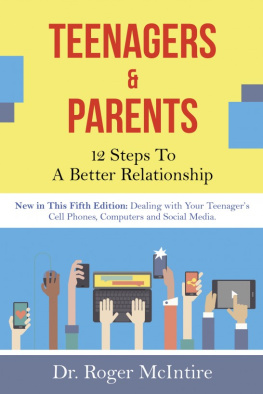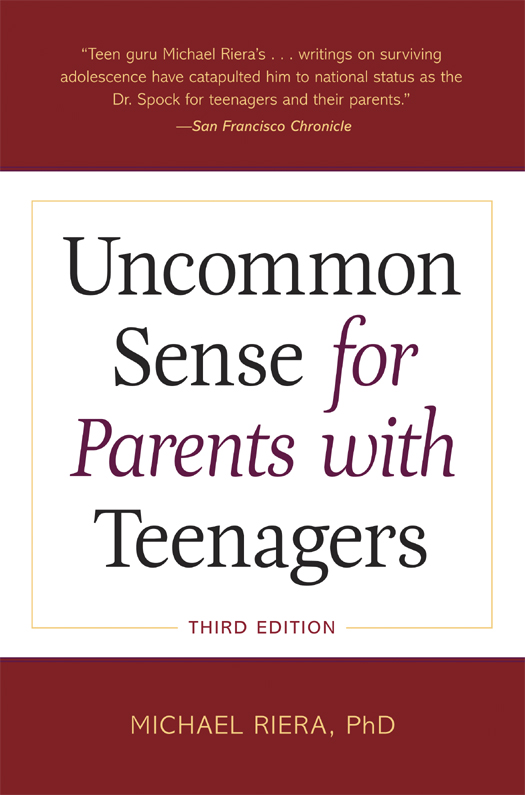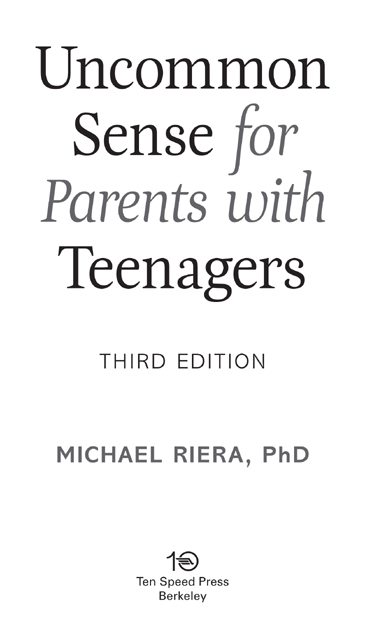Copyright 1995, 2004, 2012 by Michael Riera
All rights reserved.
Published in the United States by Ten Speed Press, an imprint of the Crown Publishing Group, a division of Random House, Inc., New York.
www.crownpublishing.com
www.tenspeed.com
Previous editions were published in the United States by Celestial Arts, an imprint of Ten Speed Press, Berkeley, CA, in 1995 and 2004.
Ten Speed Press and the Ten Speed Press colophon are registered trademarks of Random House, Inc.
Grateful acknowledgment is made to the following for permission to reprint previously published material:
CNS Productions, Inc.: Excerpts from Uppers, Downers, All Arounders, 7th Edition by Darryl S. Inaba and William E. Cohen. Copyright 2011 by Darryl S. Inaba and William E. Cohen.
William S. Mayher: Excerpts from The Dynamics of Senior Year: A Report from the Frontlines.
Tribune Media Services: On Being a Dad: A Teens Lesson in Lurching by D. L. Stewart, San Francisco Chronicle, August 21, 1991.
Library of Congress Cataloging-in-Publication Data Riera, Michael.
Uncommon sense for parents with teenagers / Michael Riera.3rd ed.
p. cm.
Includes bibliographical references.
1. Parent and teenagerUnited States. I. Title.
HQ799.15.R54 2012
649.125dc23
2012012082
eISBN: 978-1-60774-347-7
v3.1
To Betty and Pat Riera,
who made it all possible
for Peter, Tim, Dave, and me.
Love and thanks.
CONTENTS
PARENT QUESTIONS
Commonly asked questions, and where to find the responses:
ACKNOWLEDGMENTS
Without the assistance of Megan Riera and Joe Di Prisco this book would not have been written. Many, many times Ive had to borrow Megans confidence in me and my ideas. And without Joes editing and continual questioning skills, the book would have been a shell of what you hold in your hands. I owe a great deal to both Megan and Joe. Thank you.
I also want to thank all of the readers who examined and commented on the manuscript in its various stages of completionCarol and Bill Twadell, Julie Terraciano, Jane Dirkes, Al Hammer, Bodie Brizendine, John Dyckman, Hadley Hudson, Mario Di Prisco, Guy Stiles, John Erdman, and Lenzie Williams. Your input was essential.
From the first edition to this third edition there are many people to thank: my agent, Peter Beren; all the people at Celestial Arts who first believed in the book, especially David Hinds, Veronica Randall, Colleen Paretty, Kathryn Horning, Fifth Street Design, and Victor Ichioka. In this same vein, thanks to everyone at Ten Speed who did such a wonderful job on this third edition, especially Emily Timberlake and Jane Merryman.
Finally, thanks to a few of the people who have shaped my thinking over the years: Peter Baldwin, Harry Kisker, John Dyckman (again), Robert Green, and Amadeo Giorgi. Thank you.
PREFACE
This text grew out of my thirty years of experience working with more than twenty thousand teenagers and parents in a variety of settings, from middle schools to colleges, from residential treatment programs to college preparatory schools.
For me, adolescence is a fascinating stage of life. I feel most optimistic when around teenagers. If this sounds strange, understand that I typically see their best aspects, the growing-up and reaching-out aspects that are too infrequently seen at home. Adolescence is not a phase of life to be feared; rather, it is one of fascination, curiosity, and unexpected twists, and, as such, it is quite different from the previous stages of childhood and the following stages of adulthood.
What parents need is a translation of this period that makes sense and is useful. The isolation that parents of teenagers often feel is profound. Youll find lots of books on infancy and childhood, but few on adolescence. It is as if we hold our collective breaths from the end of childhood to early adulthood, and then breathe an enormous sigh of relief once adolescence has passed. I hope to replace the isolation, silence, and fear that accompany parenting during this period with optimism and hope.
This book deals with middle and high school adolescents, grades six through twelve, and conveys the range of viewpoints, struggles, and conclusions of the teenagers and parents who have come my way. While I have never heard the same conversation twice, all have carried an implicit desire for understanding that often forms the foundation of a solution.
This is not a how-to book, because all teenagers are not the same. While it is true that they all, more or less, traverse the same terrain, it is equally true that they do so with different styles, idiosyncrasies, and personalities. Just ask any parent who has more than one child. As you come to understand the context of the adolescent world, so will you recognize and admire the uniqueness of your child. Stereotypes of teenagers are misleading and blinding.
MOM (to her son walking in the door after baseball practice): So, how was school today? Anything interesting happen?
SON (as he noses through the refrigerator): Nah, just a typical day. Is there any more orange juice?
MOM : Uh, no. We finished it this morning. So, nothing exciting in school today oh, didnt you have that history test today? How do you think you did?
SON : Yeah, it was easy. Any soda in the garage?
MOM (getting discouraged): No. Your father didnt do the shopping for this week yet how about practice today? Was it a good practice?
SON (as he heads toward his room with a bowl of cereal): The usual.
MOM (a bit exasperated): John, how come you dont talk to me anymore, let alone tell me what happens at school?
SON (mildly surprised, but sort of smug): Jeez, what is this Twenty Questions or something? Im going to my room; call me when dinner is ready.
(The son then proceeds to his room, where he gets comfortable on his bed, eating his cereal, checking his social networking sites, and listening to musicwhich, to his mothers ears, is rather loud and somewhat dissonant, and, of course, prompts her to request that he turn it down.)
MOM (remembering to knock on the door): John. John, do you hear me?
SON (waiting just a bit longer than necessary): What? What do you want now?
MOM (opening the door and sticking her head into her sons room): John, please turn the music down. Im trying to get some work done out here, and I cant concentrate with that music so loud.
SON (with an exaggerated exhalation): Okay, okay! Ill turn it down. (Then, while taking his time and exaggerating his effort, he mumbles just barely loud enough for his mom to hear.) Wouldnt want to do anything to help me relax now, would we?
MOM : Did you say something?
SON (barely turning the music down): Nothing. There, its turned down. Happy now?
(Mom walks away more perplexed and frustrated than before. Five minutes later the music has miraculously gotten louder, or maybe it is just beginning to have a cumulative effect on Mom.)
MOM (knocking on the door again, only slightly harder this time): John. John, turn the music down! (Then, after a moment of no response, she opens the door.) John, please turn the music down.
SON (in a very irritated tone): Jeez, dont you believe in knocking! I mean, dont I get any privacy? I dont just walk in on you and Dad, do I? How about giving me a little respect once in a while?
MOM (at the end of her rope and quite exasperated): Just turn the music down!








